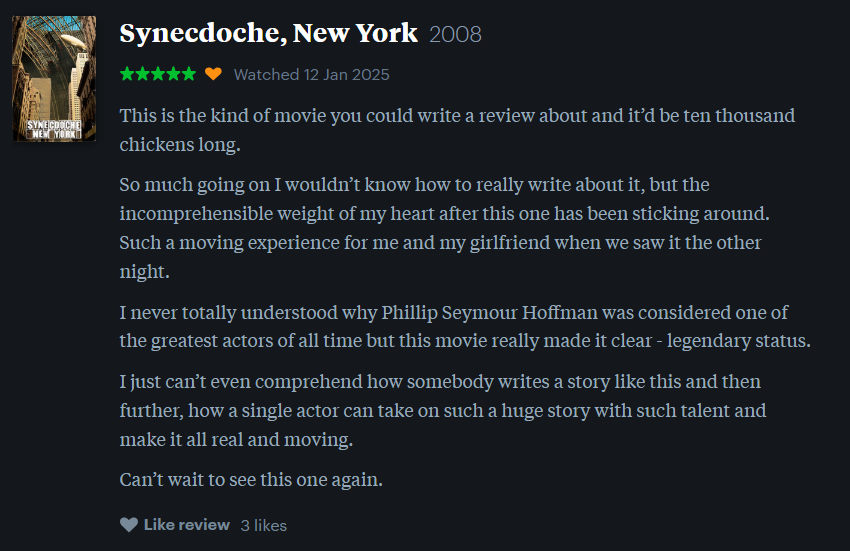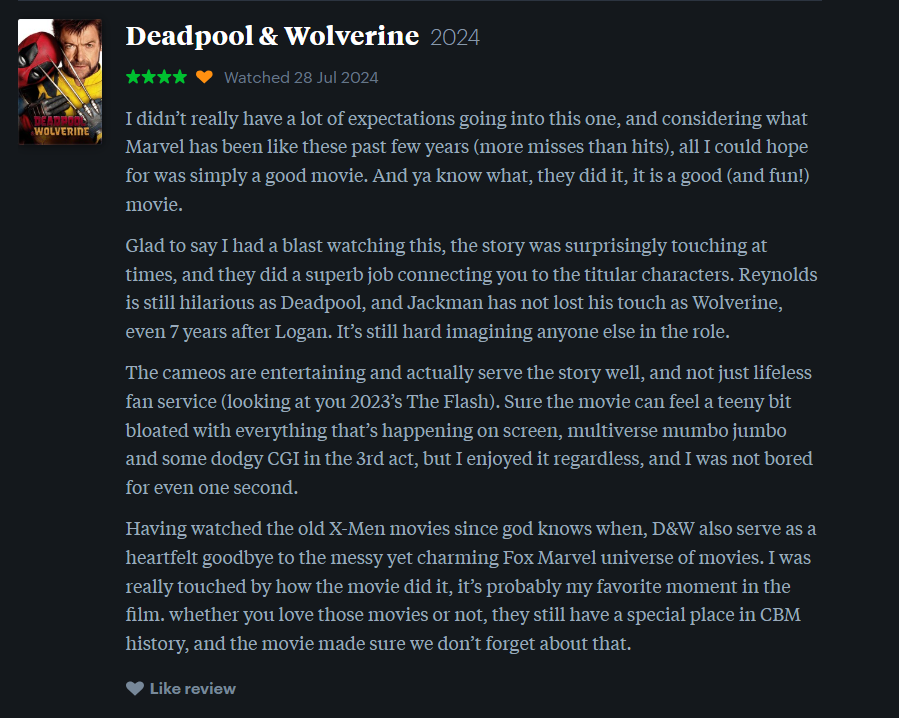If you’ve been on any internet spaces for film, you’ve probably heard the often derogatory term, “film bro,” thrown around. You know the type–overanalyzing every frame of Pulp Fiction and treating their opinions like gospel. Maybe that’s why you hesitate to write your full Letterboxd review, opting instead for a sassy one-liner.
I can personally attest to that, citing some of my own one-liner reviews like “I would give an arm and a leg to be at the Project X house party” or “the Magic doesn’t seem very Practical in my opinion” re: Practical Magic. No shame if you love writing or reading the one-liners. They’re fun! But what if you’re like me and want to know how to say more? What if you’ve got a review in you that goes beyond a tweet-length joke?
Whether you’re a cinephile, a casual viewer, or simply someone who likes cataloging every single thing they consume, writing a good Letterboxd review doesn’t have to be intimidating. Here’s how you step up your Letterboxd review game.
Spoiler alert: it’s easier than you think.
1. Know Your Voice, But Don’t Force It
If you’re not a naturally poetic, essay-style writer, you don’t need to be. The first step to any writing is to recognize your writing style. If you’re not sure what that looks like yet, the best way to figure that out is to look at your previous work. Are you a detailed analytical? Do you feel more comfortable writing as if in conversation? Maybe you write like you’re doing crowd work at the Laugh Factory, funny and smart. Whatever the approach is, be like Shakespeare and to thine own self be true. If you’re feeling pressured to write a formal, academic review of Nosferatu (2024) just because everyone else in your film club sounds super smart, but your gut reaction was “Me and who?” then that’s your review! Authenticity is key.

2. Remember the Greats
The best film reviews are compelling reading experiences because film criticism is an art form in itself. Some of the greatest critics can mix analysis and literary charm, making their reviews accessible to any reader. When writing your next review, take the time to study the greats. Roger Ebert, Pauline Kael, and Gene Siskel are a few excellent examples of critics to explore. Notice how they balance their film knowledge and their unique voices. Now, I’m not saying you have to copy them, but reading them for inspiration can elevate your own reviews. However, if you’re looking for more contemporary critics, David Ehrlich from IndieWire and K. Austin Collins are two of my personal favorites (I even follow them on Letterboxd).
3. It’s Not a Dissertation
What’s fun about Letterboxd is you’re not being graded. You don’t have to write a full-length, over-the-top review on why a certain shot in the film represented a glaring social issue of the time (unless you want to, of course). You don’t need to write a thesis statement each time you post your rating on Letterboxd. A few sentences to a paragraph can be just as impactful. It’s important to remember you don’t have to put too much pressure on yourself to sound smart. No one’s looking over your shoulder. Give enough context, historical, personal, or even cultural without turning it into a film school lecture. Context is key but this isn’t your thesis paper. We don’t need a breakdown of the cinematic history of sand as an element when you talk about Dune.

4. Reference, Don’t Namedrop
If comparisons make sense, use them. If they feel like film bro posturing, maybe reconsider. I once had a date tell me Inside Out was like a child-accessible rendition of Goddard’s Breathless. No clue what he was on. The reason I’m bringing this up is because there’s a real power in making sure your references work for you. Don’t drop off obscure names to show off your knowledge. It does not make your review immediately insightful. Focus on connecting the dots. Saying something like “There was a subtle nod to Wong Kar-Wai’s cinematography” is more effective than saying “It’s giving Tarantino” without backing anything up. Referencing filmmakers and films should enhance your point, not just prove you have “taste.”
5. More Than Just the Plot
I’ve read too many reviews that feel like I’m on a Wikipedia page and I have no idea how the writer actually feels. That being said, it’s important to write about something the average viewer wouldn’t get from the synopsis. Did it surprise you? What blew your mind? Did you spiral into an existential crisis that made you question every single choice you’ve made up to this point and you might have to call your mom? Great! Those reactions can be more interesting than simply recounting what happened. Focus on the emotional or intellectual response you had and try to convey that. Think about your reaction to the cinematography, the editing, the score, the performances– there’s so much to react to. Even in a more playful review, throwing in a quick “Juzo Itami makes food look so sensual it should be illegal” adds another layer to your thoughts.

6. Elitism is For Fascists
Okay– a little extreme but my point is: film is for everyone. Just because Twilight is not The Godfather doesn’t mean it’s not worth talking about. Dismissing a genre or fanbase in your review because you see it as “lesser than” doesn’t make you cooler than everyone, it makes you boring. There’s something to appreciate in almost any movie. There’s the campiness of a cult classic, the sincerity of a romcom, and the brilliance of an arthouse flick. Every film has something to offer. Tying this back to Twilight, don’t waste your breath poking fun at people who like it in your review. Similarly, don’t start talking about how if you haven’t seen The Godfather, you can’t call yourself a “real film fan”. Engage with a film on its terms and you will find your review to be more sincere and authentic.

7. Experiment! Experiment! Experiment!
I know I’ve been talking about going beyond the one-liner but who says a review has to be a traditional paragraph either? If you feel stuck, get creative! Try a pros and cons list, write a haiku, whatever speaks to you. Some of the most engaging reviews are the ones with personalities that break away from the norm. Your readers will appreciate the thought you put into it and will have fun with you! Like most forms of writing, this is a chance to play with structure and creativity.
8. Don’t Overthink It
At the end of the day, you’re writing a review on a movie app. Remember that Letterboxd isn’t The New Yorker and you’re not the chief critic for IndieWire. Your review is just that. It’s yours. There’s no pressure to be profound every single time you log a movie. Write what feels like you, publish it, and move on.
Conclusion
At the end of the day, the only thing worse than being a “film bro” is not saying anything at all when you have something to say. Writing your next review isn’t about proving yourself, it’s about being honest. Sometimes, a one-liner is appropriate when you don’t have a lot to say.
But when you do-
go for it.
Write the review. Make the joke. Ramble about the scene. You don’t need permission. Just write it.
Discover more from UCWbLing
Subscribe to get the latest posts sent to your email.
